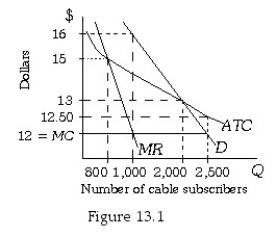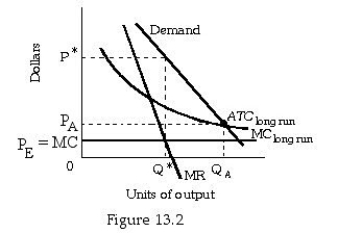Exam 13: Controlling Market Power: Antitrust and Regulation
Exam 1: Introduction: What Is Economics163 Questions
Exam 2: The Key Principles of Economics199 Questions
Exam 3: Exchange and Markets133 Questions
Exam 4: Demand,supply,and Market Equilibrium279 Questions
Exam 5: Elasticity: a Measure of Responsiveness170 Questions
Exam 6: Market Efficiency and Government Intervention120 Questions
Exam 7: Consumer Choice: Utility Theory and Insights From Neuroscience114 Questions
Exam 8: Production Technology and Cost163 Questions
Exam 9: Perfect Competition167 Questions
Exam 10: Monopoly and Price Discrimination127 Questions
Exam 11: Market Entry and Monopolistic Competition112 Questions
Exam 12: Oligopoly and Strategic Behavior116 Questions
Exam 13: Controlling Market Power: Antitrust and Regulation81 Questions
Exam 14: Imperfect Information: Adverse Selection and Moral Hazard98 Questions
Exam 15: Public Goods and Public Choice95 Questions
Exam 16: External Costs and Environmental Policy100 Questions
Exam 17: The Labor Market and the Distribution of Income177 Questions
Exam 18: International Trade and Public Policy224 Questions
Select questions type
Under an average-cost pricing policy,a local water company will face which of the following?
Free
(Multiple Choice)
4.7/5  (35)
(35)
Correct Answer:
D
What are tie-in sales?
Free
(Essay)
4.8/5  (33)
(33)
Correct Answer:
Tie-in sales are business practices under which a consumer of one product is required to purchase another product.
Tie-in sales refers to the business practice of charging different prices to different groups of consumers based on their willingness-to-pay.
Free
(True/False)
4.7/5  (35)
(35)
Correct Answer:
False
The Federal Trade Commission may attempt to block a merger if they believe that the merger will lead to greater competition and lower prices in a market.
(True/False)
4.9/5  (29)
(29)
From a business perspective,the main problem with predatory pricing is that it never ends and the firm must repeatedly lose money to drive out new competitors.
(True/False)
4.8/5  (35)
(35)
A merger is a process in which two or more firms combine their operations.
(True/False)
4.9/5  (34)
(34)
The Clayton Act outlawed specific practices that discourage competition.
(True/False)
4.9/5  (28)
(28)
A second firm will not enter a natural monopolistic market due to the large economies of scale.
(True/False)
4.9/5  (46)
(46)
If the government sets a maximum price for a natural monopolistic firm,a change in production cost will
(Multiple Choice)
4.8/5  (34)
(34)
 -Refer to Figure 13.1.If the cable company depicted was free to sell to any number of subscribers it desires and set any price,it would sell to ________ subscribers at a price of ________.
-Refer to Figure 13.1.If the cable company depicted was free to sell to any number of subscribers it desires and set any price,it would sell to ________ subscribers at a price of ________.
(Multiple Choice)
4.8/5  (28)
(28)
The practice of requiring a consumer to purchase two or more products together,rather than separately,is called
(Multiple Choice)
4.9/5  (31)
(31)
 -Refer to Figure 13.2.The profit-maximizing price for the unregulated firm would be
-Refer to Figure 13.2.The profit-maximizing price for the unregulated firm would be
(Multiple Choice)
4.9/5  (35)
(35)
A company that sells a product and is looking to be involved in the integration of another of its products,thus requiring consumers to purchase both of them together rather than separately,is engaging in a concept known as
(Multiple Choice)
4.8/5  (26)
(26)
When Interstate Bakeries tried to buy the maker of Wonder Bread,
(Multiple Choice)
4.9/5  (40)
(40)
A natural monopoly is the result of barriers such as patents and government licenses.
(True/False)
4.8/5  (30)
(30)
What is a natural monopoly? How is it different from other monopolies?
(Essay)
4.8/5  (22)
(22)
Showing 1 - 20 of 81
Filters
- Essay(0)
- Multiple Choice(0)
- Short Answer(0)
- True False(0)
- Matching(0)